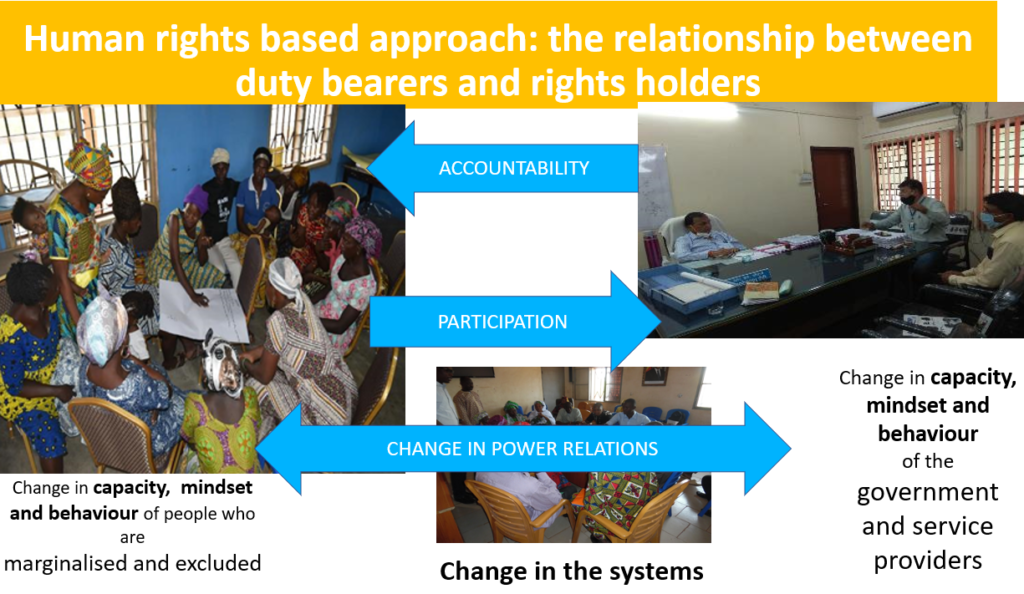The Human Rights Based Approach (HRBA) was recognised by Kofi Annan as early as 1997 when he advocated for its implementation across the UN system. It means incorporating human rights and principles into any and every aspect of a working project. It goes beyond focusing on outcomes and draws attention to the entire process, implementing human rights principles in every step of the project design, planning and operations – by applying this method, the result will have a positive effect in strengthening human rights and contribute to a sustainable outcome.

In this webinar, we celebrated the launch of the first publication that sets out a practical guide for using an HRBA in water and sanitation programmes, incorporating elements of the Human Rights to Water and Sanitation, along with the transversal principles of the HRBA.
It was an opportunity to bring together leading organisations that are working with an HRBA, namely The Office of the High Commissioner of Human Rights (OHCHR), the International Labour Organisation (ILO), the World Bank and WaterAid, and to platform some local case studies (Panama, Tunisia) that were featured in our publication.
As introduced by the President of HR2W, Dhesigen Naidoo,
“The real pandemic is one that we have to deal with on a much longer time-scale – the crisis of inequality in the world”.
HR2W legal researcher, Imanol Aguilera, moderated a multi-lingual conversation with Fredy Camerena, the Director of water and sanitation, in Pueblo Ngäbe, an indigenous community in Panama, and Saiida Zwawi, the President of Thburnica, an Agricultural Development Group in Tunisia. Both women have been established as community leaders working in water programmes through a human rights-based approach adopted by ILO.

Maria Teresa Gutierrez, explained how difficult it was to involve women in these projects, because of the institutional perception about women. Through a process of inclusion and negotiation, it was recognised that women have a strong role in the management of water, and therefore should also be involved as operators of water services.

The second half of the webinar invited experts to share their views, experiences and diagnostic tools with the panel. Rio Hada, Office of the High Commissioner of Human Rights, who was personally involved with the 1997 reforms that resulted in the Common understanding of the HRBA, noted that the HRBA is now one of the key principles of the United Nations that guides our common country programming frameworks, and socio-economic responses to Covid19.
Louisa Gosling, chairperson of the Rural and Sanitation Network on Water (RWSN) and Senior WASH officer at WaterAid, shared the rights-based approach that has been integrated into their programmes. In her opinion, ‘the ultimate aim is for a more systemic change in approaches to WASH solutions… helping people to feel entitled to claim their rights’.

To finalise the event, the World Bank introduced their new framework on analysing the weaknesses in institutional service delivery, highlighting the principles of the HRBA. According to Jonathan Grabinsky, the most severe constraints are linked to three main factors:
- Disruptions between state and WASH providers,
- Overlapping responsibilities and agendas between ministries, and
- Bottlenecks in funding linked to decentralisation.

Christian Borja Vega, Senior Economist, clarified World Bank actions in response to the pandemic, to reassess and regroup how they leverage investments that go into different sectors that are related to human rights, including water, and secondly to the fulfilment of the SDGs. Eva Kloeve, head of the World Bank Trust Fund on Human Rights Inclusion and Empowerment, stated that although the World Bank does not have an explicit policy on human rights, it can support member countries in the realization of their human rights obligations. There is a lot more focus now on structural inequality of marginalized groups as evidenced by the pandemic.
In conclusion, the collective thoughts from this webinar brought together some compelling reasons for moving towards a more systematic inclusion of human rights-based approaches. The case studies highlighted some obvious benefits in sustainability whereby local communities, and in particular the inclusion of women in meaningful participation, has resulted in long term water solutions for rural communities. The studies and experience shared by experts endorsed the areas of weakness in development programmes, such as the need for greater accountability and improved governance at local levels, increasing participation and empowering the voice of local people in service provision.
Copies of the slides presented from HR2W, WaterAid and World Bank and bios of the speakers in this event.

